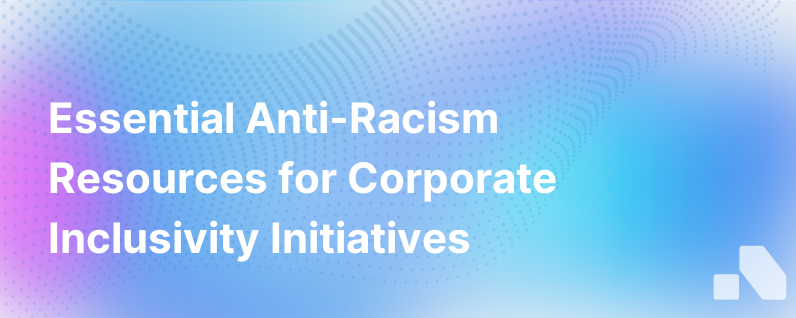
In our ongoing commitment to diversity, equity, and inclusion, we recognize the importance of understanding and actively fighting against racism in all its forms. Acknowledging and addressing racism isn't a passive task—it requires education, understanding, and deliberate action. To support individuals and organizations in this vital work, we have compiled a comprehensive list of anti-racism resources.
These resources have been carefully curated to help deepen your understanding of systemic racism, equip you with the tools to engage in anti-racist work, and empower you to make change within your communities and spheres of influence. We believe that embracing these resources is just one step in a lifelong journey of learning and advocacy.
Books
An essential starting point for education is the written word. There is a wealth of powerful literature that examines the historical context and contemporary realities of race. Here are some pivotal books that can provide foundational knowledge and insights:
-
"How To Be An Antiracist" by Ibram X. Kendi: This transformative work reenergizes the conversation around racism and provides concepts for understanding and uprooting it.
-
"So You Want to Talk About Race" by Ijeoma Oluo: Oluo offers a contemporary, accessible take on the racial landscape in America, addressing head-on the issues that prevent us from discussing race constructively.
-
"White Fragility: Why It's So Hard for White People to Talk About Racism" by Robin DiAngelo: This book explores the defensive moves that white people make when discussing racism, the reactions that maintain racial inequality, and the productive ways forward.
-
"The New Jim Crow: Mass Incarceration in the Age of Colorblindness" by Michelle Alexander: Alexander's book challenges the notion that the election of Barack Obama signaled a new era of colorblindness.
-
"Between the World and Me" by Ta-Nehisi Coates: Coates writes to his fifteen-year-old son about the feelings, symbolism, and realities of being Black in America.
Podcasts
For those who prefer to listen and learn, podcasts offer an intimate and engaging way to continue your education on anti-racism:
-
Code Switch by NPR: Hosted by journalists of color, this podcast tackles the subject of race head-on. It explores how it impacts every part of society — from politics and pop culture to history, sports, and everything in between.
-
1619 by The New York Times: This audio series examines the long shadow of American slavery. It’s named after the year the first enslaved Africans were brought to Jamestown.
-
Pod Save the People: Organized by activist DeRay Mckesson, this podcast takes a look at news, culture, social justice, and politics with a focus on issues related to people of color.
Documentaries and Films
Visual media can be a powerful tool in understanding the lives of others and the systemic issues that impact them. Leverage these documentaries and films to gain another layer of comprehension:
-
13th (Netflix): Directed by Ava DuVernay, this documentary explores the link between the Thirteenth Amendment and the prison boom in the United States.
-
I Am Not Your Negro (Amazon Prime): This documentary envisions the book James Baldwin never finished - a radical narration about race in America, using the writer's original words.
-
Just Mercy (Streaming Platforms): A powerful and thought-provoking true story, "Just Mercy" follows young lawyer Bryan Stevenson and his history-making battle for justice.
Online Resources and Articles
The internet is populated with an ever-growing expanse of articles, guides, and databases focused on anti-racism work:
-
Anti-Racism Project: Offers resources to educate people about anti-racism, and provides toolkits for action.
-
The Conscious Kid: Uses education to counter racism and promote positive identity development in youth. They support organizations, families, and educators in taking action against racism.
-
"75 Things White People Can Do for Racial Justice" on Medium: This article is an evolving resource for white people looking to help fight racism in actionable, impactful ways.
Workshops, Training, and Talks
To deepen the learning experience, consider attending workshops or training sessions:
-
"Talking About Race" by The National Museum of African American History & Culture: This online portal helps individuals, and organizations explore and discuss race, racial identity, and the ways they shape American culture.
-
Coursera's "Race and Cultural Diversity in American Life and History:" An online course that provides a broad and interdisciplinary introduction to the concept of race and racial relations in the United States.
Local and National Organizations
Supporting organizations doing the groundwork is crucial. Donating time or resources can make a substantial difference:
-
The NAACP (National Association for the Advancement of Colored People): Fights for social justice for all Americans.
-
Black Lives Matter: An organization dedicated to combatting racism and mobilizing activists.
-
The ACLU (American Civil Liberties Union): Works in courts, legislatures, and communities to defend and preserve the individual rights and liberties that the Constitution and laws of the United States guarantee everyone in this country.
Conclusion
Anti-racism is a proactive and continuous effort. Reading books, listening to podcasts, watching documentaries, participating in discussions, and supporting organizations are all parts of a broader commitment to dismantling systemic racism. It’s important to recognize that this list is not exhaustive nor a solution in itself; it's a starting point. We encourage you to engage with these resources as one aspect of a dedicated and ongoing personal and organizational commitment to anti-racist learning and action.
Moreover, fostering an inclusive environment within our own organizations, acknowledging privileges, addressing internal biases, and encouraging others to do the same are equally crucial steps. We must hold ourselves and each other accountable, be open to learning and changing, and use our voices to advocate for equity and justice. Together, through continuous learning and measurable actions, we can contribute to a more equitable world.